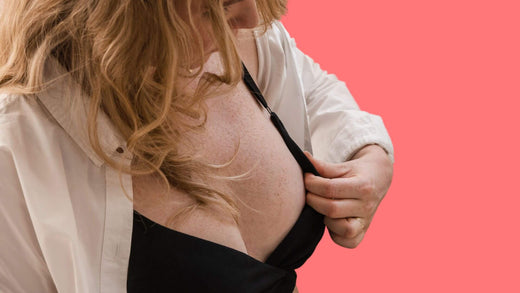
De meeste zwangere vrouwen focussen zich op de bevalling, maar wat vaak vergeten wordt, zijn de borsten – het meest veranderende deel van je lichaam, zeker tijdens je zwangerschap. Nina Cingel, lactatiekundige bij de Boezemvriend, weet alles over borsten en baby’s. Dagelijks begeleidt ze moeders (en vaders) bij vragen over borstvoeding. Zij is dan ook de aangewezen persoon om meer inzicht te geven in wat er precies met je borsten gebeurt tijdens de zwangerschap, kraamtijd en daarna.
Wat gebeurt er met je borsten tijdens de zwangerschap?
"Borsten zijn het meest veranderende deel van het vrouwenlichaam, vooral tijdens de zwangerschap," vertelt Nina. De meeste vrouwen merken vaak dat ze zwanger zijn doordat hun borsten beginnen te groeien. In het begin gebeurt dit snel: je borsten zwellen op en je merkt dat je bh niet meer goed past. Wist je dat het hele lactatiesysteem al bij meisjes in de buik wordt aangelegd? Zodra de zwangerschapshormonen in werking treden, bereidt het lichaam zich voor, als een melkfabriek in opbouw.
Fases van borstveranderingen tijdens de zwangerschap
De eerste drie maanden zie je de meeste veranderingen. Daarna lijkt het proces stil te staan in de komende 3 tot 5 maanden. Aan het einde van je zwangerschap begint de borstontwikkeling weer. Je merkt bijvoorbeeld opgezette melkklieren en misschien dat je bh’s opnieuw niet passen – dit is allemaal normaal. Je lichaam bereidt zich voor op de geboorte en de melkproductie.
Borsten tijdens de kraamtijd
"Na de geboorte van je kindje krijg je vaak nog grotere borsten, die lijken te ontploffen van de melk. Dit is een tijdelijke fase die maximaal 72 uur duurt," legt Nina uit. De eerste weken na de bevalling merk je niet veel verschil, maar geleidelijk aan neemt de omvang van je borsten af. Dit komt deels door gewichtsverlies en doordat de melkproductie stabiliseert als je borstvoeding geeft. Na ongeveer 8 weken kan het lijken alsof er niet veel meer over is van je borsten, maar dat is omdat ze tot rust komen en zich terugtrekken naar hun normale omvang.
Borsten na zwangerschap: Wanneer kun je weer in je oude lingerie?
"Het is mogelijk dat je na borstvoeding totaal andere borsten hebt, of dat je zwangere borsten weer teruggaan naar hun oorspronkelijke formaat. Dit hangt van veel factoren af. Alles is normaal," zegt Nina. Dit is het belangrijkste advies dat ze vrouwen mee wil geven: het is helemaal normaal dat je borsten veranderen tijdens deze periodes.
